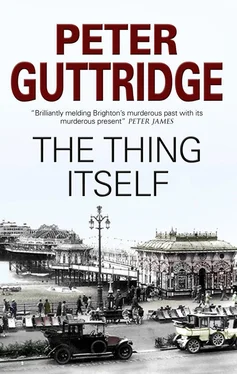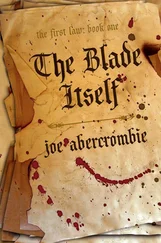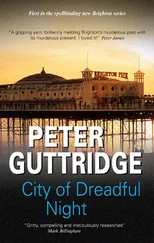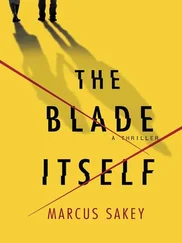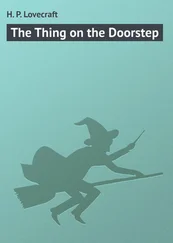Peter Guttridge - The Thing Itself
Здесь есть возможность читать онлайн «Peter Guttridge - The Thing Itself» весь текст электронной книги совершенно бесплатно (целиком полную версию без сокращений). В некоторых случаях можно слушать аудио, скачать через торрент в формате fb2 и присутствует краткое содержание. Жанр: Триллер, на английском языке. Описание произведения, (предисловие) а так же отзывы посетителей доступны на портале библиотеки ЛибКат.
- Название:The Thing Itself
- Автор:
- Жанр:
- Год:неизвестен
- ISBN:нет данных
- Рейтинг книги:5 / 5. Голосов: 1
-
Избранное:Добавить в избранное
- Отзывы:
-
Ваша оценка:
- 100
- 1
- 2
- 3
- 4
- 5
The Thing Itself: краткое содержание, описание и аннотация
Предлагаем к чтению аннотацию, описание, краткое содержание или предисловие (зависит от того, что написал сам автор книги «The Thing Itself»). Если вы не нашли необходимую информацию о книге — напишите в комментариях, мы постараемся отыскать её.
The Thing Itself — читать онлайн бесплатно полную книгу (весь текст) целиком
Ниже представлен текст книги, разбитый по страницам. Система сохранения места последней прочитанной страницы, позволяет с удобством читать онлайн бесплатно книгу «The Thing Itself», без необходимости каждый раз заново искать на чём Вы остановились. Поставьте закладку, и сможете в любой момент перейти на страницу, на которой закончили чтение.
Интервал:
Закладка:
Early in 1935 I left the police. A combination of things. My bosses didn’t like the relationship I’d had with the press. And word had got back I’d been with the Blackshirts at Olympia. They didn’t seem to know about Philip Simpson and I didn’t say. It was ironic that I’d been thinking of quitting the BUF yet my membership had lost me my job.
I’d been hesitating because I’d been impressed that Mosley had set up a youth movement that was a bit like the Boy Scouts — Baden-Powell was a fascist sympathizer, of course. There was a lot of paraphernalia — uniforms, badges, saluting, flags — but the idea was a good one.
I went up to Chelsea for a meeting with Joyce and Knowles.
‘I’m ready to move up. Is there anything for me?’
Knowles picked up a sheet of paper.
‘You’re from Lancashire, yes?’
‘My family is.’
‘You still have family there?’
‘Not who speak to me.’
I think my mother’s father was still alive but we didn’t have anything to do with him.
‘We’ve got a problem up there. Last week a group of our members in Colne overheard a bunch of men talking in a foreign language. Someone told our members these foreigners were learning about cotton so they could go back home and set up in competition. Defending cotton is one of our main aims. Our members attacked the foreigners. Beat them perhaps too enthusiastically. And then we discovered the foreigners were a bunch of Esperantists from Burnley and Bacup, in Colne to celebrate the opening of their new premises.’
I burst out laughing. Joyce and Knowles both gave me fierce looks.
‘You have to admit-’ I started to say, then stopped when Joyce gave me a warning look. ‘That wouldn’t happen under my command,’ I said more soberly. ‘I’ve been a policeman. I know how to assess situations.’
‘The BUF official policy is against chain stores and in favour of local shopkeepers. A number of chain stores are moving into those northern towns. That and cotton must be our focus.’
Joyce leaned forward, his hands clasped.
‘Are you up to it? Will you help us revolt against the united muttons of the old gangs of British politics?’
Two weeks later I was back in the town of my ancestors. My district stretched across through Accrington and Burnley to Nelson and Colne. I found the BUF were popular in the north-west because of that history of individualism that came out of Methodism decades before. The Tories usually got a lot of working-class votes and even the unions were conservative. The cotton manufacturers were major contributors.
But the set-up was a bit of a joke in my area. My second-in-command was the head of the woman’s unit, Nellie Driver. First thing she said to me was: ‘A God-fearing non-boozer can thread ten needles whilst the boozer is still trying to pick the needle up.’
She complained all the time that nobody saluted her with a ‘Hail Nellie’ when they saw her. Nellie moaned that in Nelson they had to share premises with a spiritualist group doing shell and photograph seances. The spiritualists kept putting their notices over the Blackshirt ones on the joint noticeboard — and wouldn’t let them use the sink.
The Blackshirts were the biggest load of misfits you could imagine. Crooks, faddists, Mormons, pacifists, Christadelphians, antivivisectionists. None of them would go out on the street selling our newspaper because they didn’t want anyone to know they were members and they were frightened of getting beaten up by the Reds.
One bloke who worked on a lathe in a factory offered to knock off some knuckledusters from odd scraps of brass or some other hard metal. The north-west was tough in those days. My uncle had been kicked to death in a drunken brawl with some Irish navvies outside a pub in Burnley back in 1922. An argument, the newspapers called it. Some bloody argument. The papers blamed the number of pubs in Burnley for the violence — there were fifty-six licensed houses within three hundred yards of the market hall.
There were fights every night. Fists, feet and broken glasses. If you went down, it was all over. Weavers, colliery workers and navvies all fought in their clogs. They had wooden soles, shod with iron. If you were on the dole and had no money, you shod your clogs with bits of old car tyres cut to shape.
I couldn’t stay in this job. I realized I’d made a mistake when a few weeks later, in March 1935, the word came about a change of emphasis in our message. We were told to give more prominence to the question of the Big Jew and the Little Jew. Jews had always been prominent among those disrupting Blackshirt meetings. The memorandum insisted it was not about race, it was about nationality. Some Jews were acting against the British national interest through their role in international finance. They were in fact an ‘alien menace’.
I have my faults but anti-Semitism isn’t one of them. And it was clear Mosley had taken this decision to appeal to the worst kind of bigots, although anti-Semitism was rife in his class as a matter of course. I didn’t think it would wash in the north-west. Not so much because the folk were particularly tolerant, just that there were hardly any Jews around, except in Manchester.
Was picking on people really ‘the steel creed of the iron age’?
I went down to London to give my notice in person. I wasn’t sure what exactly I was going to do with my life but I couldn’t in all conscience do this.
Just before I left, I had a strange encounter in a butcher’s shop in Clayton, over Bradford way. The butchers were called Pierrepoint and the open secret was that three of them had another job. Hangmen. Henry and then his brother Tom were both Official Executioners as a sideline. Henry had not long ago been fired for turning up drunk in Chelmsford and fighting with his assistant. Tom had taken over.
Then Henry’s son, Albert, had applied. They were all non-descript but Albert was a very quiet one. He was an assistant first, in 1931, and told me he was looking forward to being in charge. He said this while wearing a bloodstained white coat with cuts of meat in trays before him, skinned pigs and legs of lamb hanging on steel hooks behind him.
People remain a mystery to me.
I got in to see William Joyce back in London. His office was bedecked with BUF flags. He looked up from behind a long polished desk and didn’t ask me to sit down. He listened but shook his head throughout my little speech.
‘As you wish,’ was all he said at the end, returning to his work.
As I was standing on the pavement outside, wondering where to go next, Martin Charteris came down the steps behind me in his civvies with Tony Frederick, the former music hall performer.
‘What are you doing here?’ I said to Frederick.
He pointed at the camera slung round his neck.
‘I live here now. I’m the official photographer for the BUF.’
He excused himself and strutted off down the street. I watched him go, then turned to Charteris.
‘You here to see the Galloping Major, then?’ I said.
‘Nah, I work here too. I’m head office now. You got time for a drink?’
‘I’ve got nothing but time. How’s your friend Tony Mancini?’
Mancini/Notyre had got off his murder charge thanks to his cunning barrister, Norman Birkett.
Charteris laughed at that.
‘You’ll see.’
We walked across St James’s Park. Charteris stopped me at one point and indicated the bushes beside the lake.
‘I’ve spent a lot of time in those bushes with guards from the barracks across the road in St James’s Palace. Do you fancy a quick one?’
I looked at the big grin on his face.
‘Not my thing, Charteris. You know that.’
He laughed again and led the way across to Piccadilly, then over into Soho.
Читать дальшеИнтервал:
Закладка:
Похожие книги на «The Thing Itself»
Представляем Вашему вниманию похожие книги на «The Thing Itself» списком для выбора. Мы отобрали схожую по названию и смыслу литературу в надежде предоставить читателям больше вариантов отыскать новые, интересные, ещё непрочитанные произведения.
Обсуждение, отзывы о книге «The Thing Itself» и просто собственные мнения читателей. Оставьте ваши комментарии, напишите, что Вы думаете о произведении, его смысле или главных героях. Укажите что конкретно понравилось, а что нет, и почему Вы так считаете.
